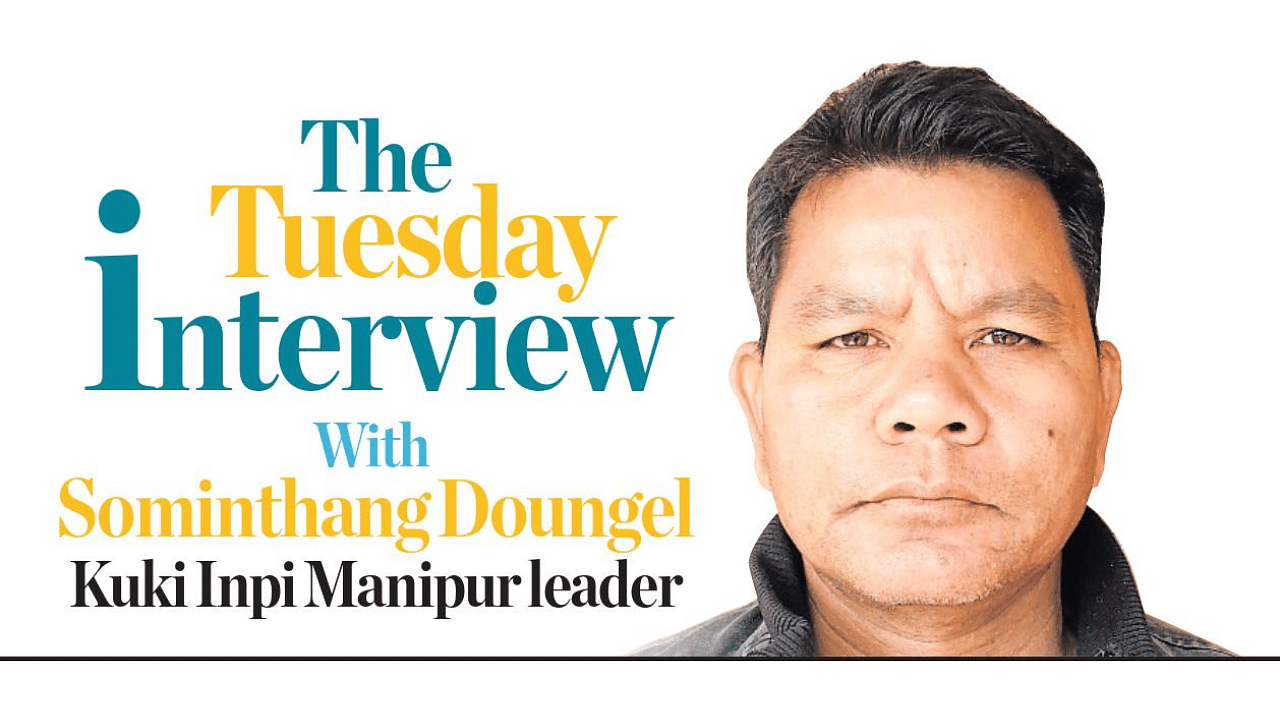
Home Minister Amit Shah’s announcement about fencing the border with Myanmar and ending the decades-old Free Movement Regime (FMR) left the Kukis, Mizos, and Nagas upset and angry. Although this step is among the major demands of the majority Meitei community and the BJP government in Manipur for ending the conflict continuing since May last year, Sominthang Doungel, a leader of Kuki Inpi Manipur, an apex body of the Kukis in Manipur, tells DH’s Sumir Karmakar that fencing would “further divide” the ethnic communities living on both sides.
Do you see any connection between the ongoing violence in Manipur and the Centre’s decision to fence the border with Myanmar and end the FMR?
The situation in Myanmar is a matter of concern to the Government of India. The activities of the Myanmar Army on one side and the ethnic armed organisations and the pro-democracy People’s Defence Force, who are feeling the pressure to come to the Indian side of the border in Manipur, on the other, could be among the reasons why the centre decided to fence the border. I don’t think the Centre’s decision to fence the border has any connection with the violence in Manipur. Even if it has, it is never going to solve the violence in Manipur. After all, constructing fences along the border is not a solution to the violence in Manipur. There will be peace in Manipur once the Meiteis stop attacking the Kukis and a separate administration by way of a Union Territory with the legislature is granted to the Kukis.
Why are the Kuki-Zo-Naga people opposed to the move to fence the border?
The Kuki people have been living in the northwestern part of Myanmar and the northeastern part of India much before there was an international boundary. There were no Manipur, Nagaland, or Mizoram in those days. The Kukis are the first inhabitants of the land they occupy today. The land was not offered by anyone out of sympathy. The international boundary line between India and Myanmar was created by the British government without consulting the Kukis. Building fences along the India-Myanmar border will divide
the Kuki people who are living in India and Myanmar and also deprive them of all connection and cooperation between them.
But many in Manipur, including the government, say that the open border is being misused for anti-India activities.
The Meiteis should accept the bitter truth that the border is being misused for anti-India activities by Meitei secessionist groups, who carry out illegal drug trafficking and attacks on the Central forces. They should have the courage and honesty to admit that the Meitei secessionist groups maintain camps in Myanmar, from which they infiltrate into India and launch deadly attacks against the central forces.
The government of India termed these Meitei armed groups “terrorist organisations” under the Unlawful Activities (Prevention) Act 1967. Many of these outfits were formed with the assistance and support of hostile powers like China and Pakistan, and they continue to receive financial support and arms from these countries, particularly China. Former Indian Army chief M M Naravene once suggested that there is a Chinese hand behind the current Manipur violence. These Meitei terror outfits were formed with the goal of setting up a sovereign Manipur and are, therefore, a threat to the territorial integrity of India.
Manipur CM N Biren Singh also talks about the illegal migration of the Kukis, drug trafficking, and the influx of militants from Myanmar.
The false narrative of massive illegal immigration from Myanmar has been created with the sole intention of supporting the narrative that Kukis are ‘foreigners’ and illegal migrants, that they don’t belong to Manipur, but the truth is that the Kukis have inhabited Manipur for ages, and the free movement regime has been working well not only for the Kukis and Nagas but for all communities, including the Meiteis, who have benefited from it commercially more than any other communities.
The drug menace in the state cannot thrive without police connivance, and there cannot be a drug business without the connivance of the police and political leaders. Manipur Chief Minister N Biren Singh, who went extra vocal in his campaign for the war against drugs, has been accused by a senior officer of the state Narcotics and Affairs of Border Bureau (NAB) of allegedly putting pressure on the department to drop the case against a person accused in a drug seizure raid that took place in June 2018.
Associating only the Kuki community with the poppy plantations in Manipur is unfair; all communities, including Meiteis and Nagas, are equally involved.
What do you think should be the way forward?
Every political problem in Manipur is related to the land issue in some way. The crux of the matter is overlapping claims over land rights by both Kukis, Meiteis, and Nagas. The best way forward is to set up a boundary commission to be led by central leaders with equal representation from Kukis, Nagas, and the Meiteis.
Do you think it’s possible to check illegal migration and drug trafficking by keeping the border open?
Checking illegal migration and drug trafficking is a great challenge. But it’s also possible to check illegal migration and drug trafficking by keeping the border open. Nationality verification at the border checkpoint continuously for identification of illegal migrants and their deportation from India, heightened presence of border patrol agents along the border, and using detection technology with genuine dedication and sincerity on the part of the border security officers should also be taken into account.